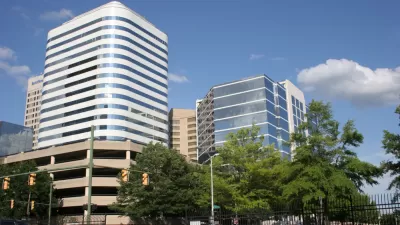The Virginia city is replete with underused off-street parking lots, which city councilors hope to make available for parking at more times while encouraging transit use.

Richmond, Virginia joined the growing list of cities to repeal parking minimums as one strategy for making housing more affordable and less costly to build, reports Elizabeth McGowan in Next City.
The move was, surprisingly, approved unanimously by the city’s Planning Commission and city council. City Councilor Andreas Addison, who has been a staunch supporter of repealing parking requirements, points out that there is plenty of parking space in the city, it’s just often designated for one single use, making it obsolete the rest of the time. “When that data was presented, I realized we don’t have a parking problem,” said Addison, “We have a lack-of-access-to-parking problem.”
Addison “envisions the new measure will ‘reinvent paved space’ by introducing the concept of shared parking in off-street lots. Before, those spaces could only be used for the particular purpose laid out in the zoning code.”
Meanwhile, the Greater Richmond Transit Company (GRTC) is still offering free rides on its buses and opened a high-capacity bus rapid transit line five years ago. “Addison is hopeful Richmond’s decision to scale back on parking lots can be a model for other Virginia cities intent on reshaping how people move around.”
FULL STORY: Richmond Scraps Parking Space Rules In An Effort To Curb Transportation Emissions

Planetizen Federal Action Tracker
A weekly monitor of how Trump’s orders and actions are impacting planners and planning in America.

San Francisco's School District Spent $105M To Build Affordable Housing for Teachers — And That's Just the Beginning
SFUSD joins a growing list of school districts using their land holdings to address housing affordability challenges faced by their own employees.

The Tiny, Adorable $7,000 Car Turning Japan Onto EVs
The single seat Mibot charges from a regular plug as quickly as an iPad, and is about half the price of an average EV.

Seattle's Plan for Adopting Driverless Cars
Equity, safety, accessibility and affordability are front of mind as the city prepares for robotaxis and other autonomous vehicles.

As Trump Phases Out FEMA, Is It Time to Flee the Floodplains?
With less federal funding available for disaster relief efforts, the need to relocate at-risk communities is more urgent than ever.

With Protected Lanes, 460% More People Commute by Bike
For those needing more ammo, more data proving what we already knew is here.
Urban Design for Planners 1: Software Tools
This six-course series explores essential urban design concepts using open source software and equips planners with the tools they need to participate fully in the urban design process.
Planning for Universal Design
Learn the tools for implementing Universal Design in planning regulations.
Smith Gee Studio
City of Charlotte
City of Camden Redevelopment Agency
City of Astoria
Transportation Research & Education Center (TREC) at Portland State University
US High Speed Rail Association
City of Camden Redevelopment Agency
Municipality of Princeton (NJ)





























